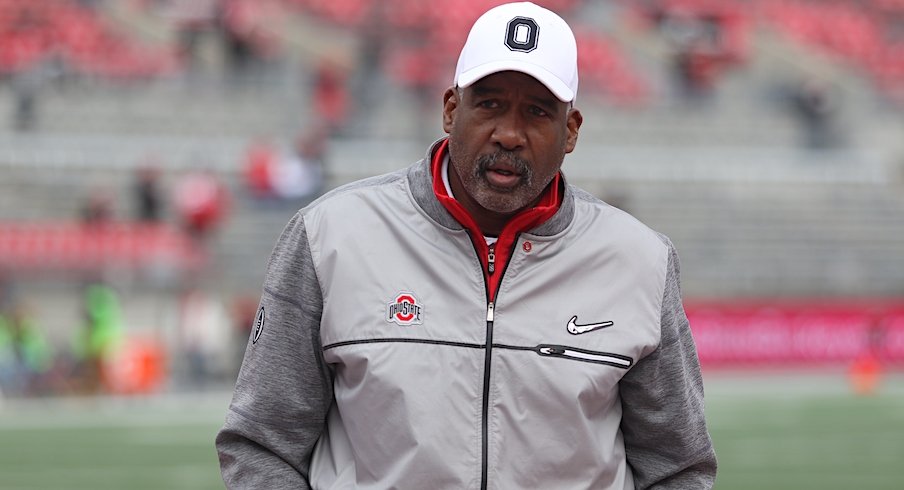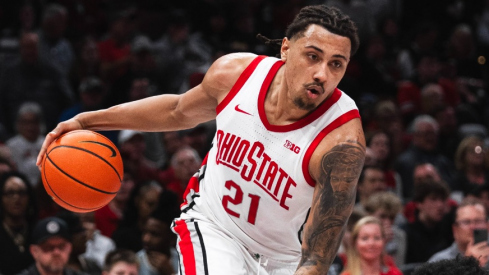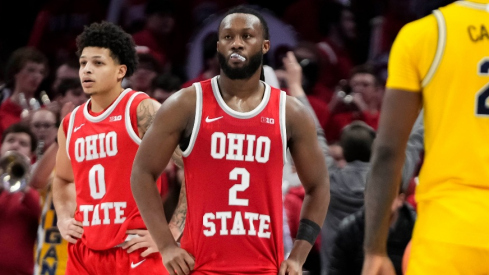As protests against racial injustice continue throughout the United States following last week’s killing of George Floyd in Minneapolis, athletic director Gene Smith wants Ohio State's student-athletes to be a part of the conversation.
So when men’s basketball player Seth Towns was detained during a protest in downtown Columbus on Friday, Smith texted and quote-tweeted Towns to show he supported him “wholeheartedly.” And he encourages all of Ohio State’s student-athletes to use their platform to speak up.
“All of our student-athletes have the right to express themselves,” Smith told Eleven Warriors on Monday. “They’re our future, and I think this is an educational moment. They have the ability to do what other generations haven’t done. And so them seeing this, watching this and paying attention to this and then having the conversations with their teammates and coaches and athletic support staff and parents, hopefully will open their eyes to the fact that you know what, we have a responsibility to change this. So when they’re in the locker room or we’re in a group situation somewhere, if someone shows that racist tendencies or racist behaviors, they’re strong enough to step up.”
Smith wants the Buckeyes to stay safe and abide by the law, of course, but he isn’t going to discourage them from protesting peacefully – and he expects that they will advocate for change in the right way.
“It only concerns me that one of them might get overambitious and go into the middle of a riot,” Smith said. “But I don’t think that’s gonna happen because we have, our kids are so smart and conscientious. So I look at this as it’s unfortunate that we’re here, but for our student-athletes, I look at it as that educational opportunity where they can ultimately employ their talents and skills to affect change.”
He believes it’s “extremely important” for coaches – like Chris Holtmann and Ryan Day, who both did on Friday – to use their platform to advocate for change, as well.
“All of us have some sphere of influence, and if we can influence people to change or influence people who might have the ability to change the system, then we need to speak up,” Smith said. “So I support them 100 percent, and I think all coaches should do that.”
None of this is new to Smith. His mother, who was born in the rural South in 1926, often faced racism growing up. He grew up during the height of the 1960s civil rights movement. Over the years, he’s seen countless examples of black people being killed and the fight for justice.
Now as an athletic administrator, Smith draws from that experience when talking to Ohio State’s student-athletes about race relations. Because while there have been many protests against racial injustice and police brutality in the past, many of them haven’t led to lasting changes, and he believes young people – like Ohio State student-athletes – will play a crucial role in ensuring changes are made this time around.
“Unfortunately, I grew up in the ‘60s and ‘70s and early ‘80s, and I’ve been here before,” Smith said. “I’ve seen this before. It’s painful. It’s really painful. So I just keep trying to keep in front of me, where can I affect change? What can I do to help make sure that we affect change?
“I was having a conversation actually yesterday, that someone mentioned it was the first time they saw a black man killed like that, and it’s not my first. Technology and social media have really brought exposure to what has been happening for a long time. And now, people are reacting because it’s in their face. And so what I try and teach our student-athletes is that, we’ve been here before, but we’ve never really fixed it. So be a part of the solution to fix it. Talking to my coaches, we had a coaches’ meeting this morning, they’re the ones that are actually engaging our student-athletes more than me. And so it’s more about, how do we help our young people not let this issue die?
“In the past, when we were here before, we have the protests, have the riots and then things would subside. And that’s my concern now, is we’ll be sitting here in June 1, 2021, and things would have subsided and hopefully even COVID-19 is behind us, and nothing’s changed. So how do we make sure that doesn’t happen again? How do we come up with some type of tactics, strategies to employ? I don’t think you’re ever going to totally eradicate racism in my time, but we can certainly mitigate it and expose it.”
“They’re our future, and I think this is an educational moment. They have the ability to do what other generations haven’t done.”– Gene Smith on encouraging Ohio State's student-athletes to speak up about racial injustice
With a diverse roster of student-athletes that includes men and women from not only all over the country but all over the world, Ohio State already educates its student-athletes regularly on topics like race, ethnicity, sexual orientation and socioeconomic backgrounds. Smith anticipates there will be more conversations about race relations when the Buckeyes’ student-athletes are back on campus.
“The beauty of sport is you set aside your race, your ethnicity, your religion, your socioeconomic background, whether you’re from a rural environment or urban environment or you come from a dual-parent home or a single-parent home, you set all those differences aside, and you work together as a team toward one common goal,” Smith said. “And what’s beautiful for us is we can roll race into all the other issues. There’s no question that in our society and in our teams, there are people who have different sexual preferences. So learning how you respect someone who has those different sexual preferences. Learning how you respect someone from another country, because we have a large number of student-athletes that are international. Respect their culture, their habits. So what we’ve been able to do in the past is roll race into that conversation. And we’ll probably heighten that a little bit more as a focal point.”
From Smith’s personal point of view, he believes education and constantly addressing issues when they arise are crucial to achieving the ultimate goal of eliminating racism and the influence racists can have on American society.
“I think first and foremost, it starts with education,” Smith said. “And when I think about our student-athletes, it’s providing them an opportunity to have platforms to have open and honest conversations about racism. People have a hard time talking about race. But when you open it up and allow people to talk about it, my dad always taught me and I don’t know who he was quoting, but he always said ‘Through the eyes of others you see yourself.’ And so, when you have those conversations, you don’t only learn about that other person, you learn about yourself.
“Then secondly, making it a part of what we address all the time. With everyone, every organization,” Smith continued. “At some point in our time, racism really went covert. It wasn’t as overt as it is now, it went covert, and it was underground. The racists had to go work somewhere. And some of them are police officers. Some of them work in other places. But when we see it, we got to deal with it. And I don’t know what the 18 complaints were against the police officer in Minneapolis. But somewhere in there, somebody should have seen something, I would think, I’m guessing. So you deal with it. You deal with that behavior, at that moment in time. Otherwise, you get to where we are.
“It starts at the top of organizations. And you have to deal with that attitude. I think it’s a disease. I think it’s something that people are learned, they’re not born with it. And we have to come up with strategies to mitigate it. It starts with conversation, and then ultimately when you see it, you gotta deal with it.”


